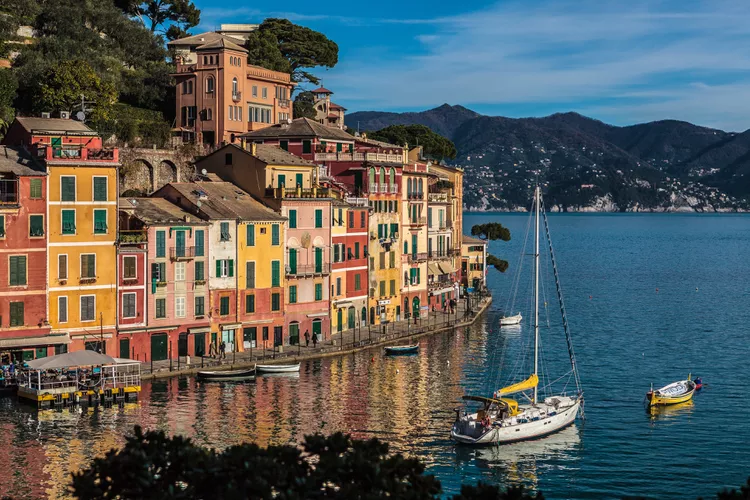Summary
The fishing village of Portofino on the Italian Riviera is renowned as a resort for the elite. This picturesque, crescent-shaped seaside village features pastel houses lining the shore of the harbor, complemented by a selection of shops, restaurants, cafes, and luxury hotels. Moreover, the clear green waters around Portofino are teeming with marine life, while a castle perched atop a hill offers stunning views of the village. Visitors can enjoy a myriad of activities including hiking, diving, and boating.
Portofino is situated on a peninsula in Tigullio Gulf, just east of Genoa in the northern Italian region of Liguria. Nearby towns such as Santa Margherita Ligure, a larger resort town, and the charming fishing village of Camogli, are also worth exploring.
Transportation
Frequent ferries operate to Portofino from Santa Margherita Ligure, Rapallo, and Camogli from late spring through early fall. Additionally, boat services from Genoa or other towns along the Riviera can bring you to this enchanting destination. The closest train stations are located in Santa Margherita Ligure and Camogli.
A bus station for travel to Portofino is conveniently located just outside the Santa Margherita station. It’s important to note that Portofino is largely car-free, although you can drive along the narrow, winding road leading to a small parking lot. During the busy summer tourist season, Portofino tends to become quite crowded, making driving and parking a challenge.
Where to Stay and Eat
For accommodation, consider the Eight Hotel Portofino, a four-star resort, or the more affordable Hotel Piccolo Forno, also a four-star property situated in a charming period villa. Additional options can be found in Santa Margherita Ligure, which serves as an excellent base for visiting both Portofino and Cinque Terre.
When it comes to dining, Portofino’s culinary scene specializes in seafood, complemented by traditional Genovese specialties such as green minestrone. Most restaurants are located around the harbor; however, be prepared for a higher cover charge in these establishments.
You may also want to indulge in local wines and visit Villa Prato, famous for its stunning gardens and wine cave, on a wine tasting tour in picturesque Portofino.
Castello Brown
Castello Brown is a grand fortress built in the 16th century, now serving as a house museum. The castle became the residence of Yeats Brown, the British consul to Genoa, in 1870. Nestled above the village, this historical site can be accessed via a scenic path from the Botanic Garden. Visitors are treated to breathtaking views of Portofino and the surrounding sea, as well as displays of furnishings and photographs belonging to the Browns, along with images of many famous visitors.
San Giorgio Church and Lighthouse
While en route to the castle, stop by San Giorgio Church, which was reconstructed after the last war. Another picturesque pathway leads you to the lighthouse, known as Faro, located on Punta del Capo.
Portofino Regional Park
Portofino Regional Park boasts numerous hiking trails both along the coast and inland—many presenting spectacular views. The northern area of the park is lush with diverse trees, while the southern region showcases an abundance of wildflowers, bushes, and grasslands. Olive trees are prevalent in many areas, and orchards and gardens can often be found near the villages.
Portofino Marine Protected Area
Much of the waters along the coast from Santa Margherita around to Camogli comprise a marine protected area, where swimming is prohibited in certain locations. Enthusiasts can explore 20 dive sites arranged through local dive agencies. Swimming is allowed only in designated areas, and boating is restricted close to some shorelines. The coastline is rugged and steep in many parts.
San Fruttuoso Abbey
On the opposite side of the peninsula, reachable from Portofino by a two-hour hike or by boat, lies the Abbazia di San Fruttuoso. This 11th-century abbey is beautifully surrounded by pine and olive trees. Beneath the waters near San Fruttuoso, you will find a remarkable bronze statue of Christ, known as Cristo degli Abissi, safeguarding sailors and divers. Every July, an underwater procession occurs to place a laurel crown on the statue.




